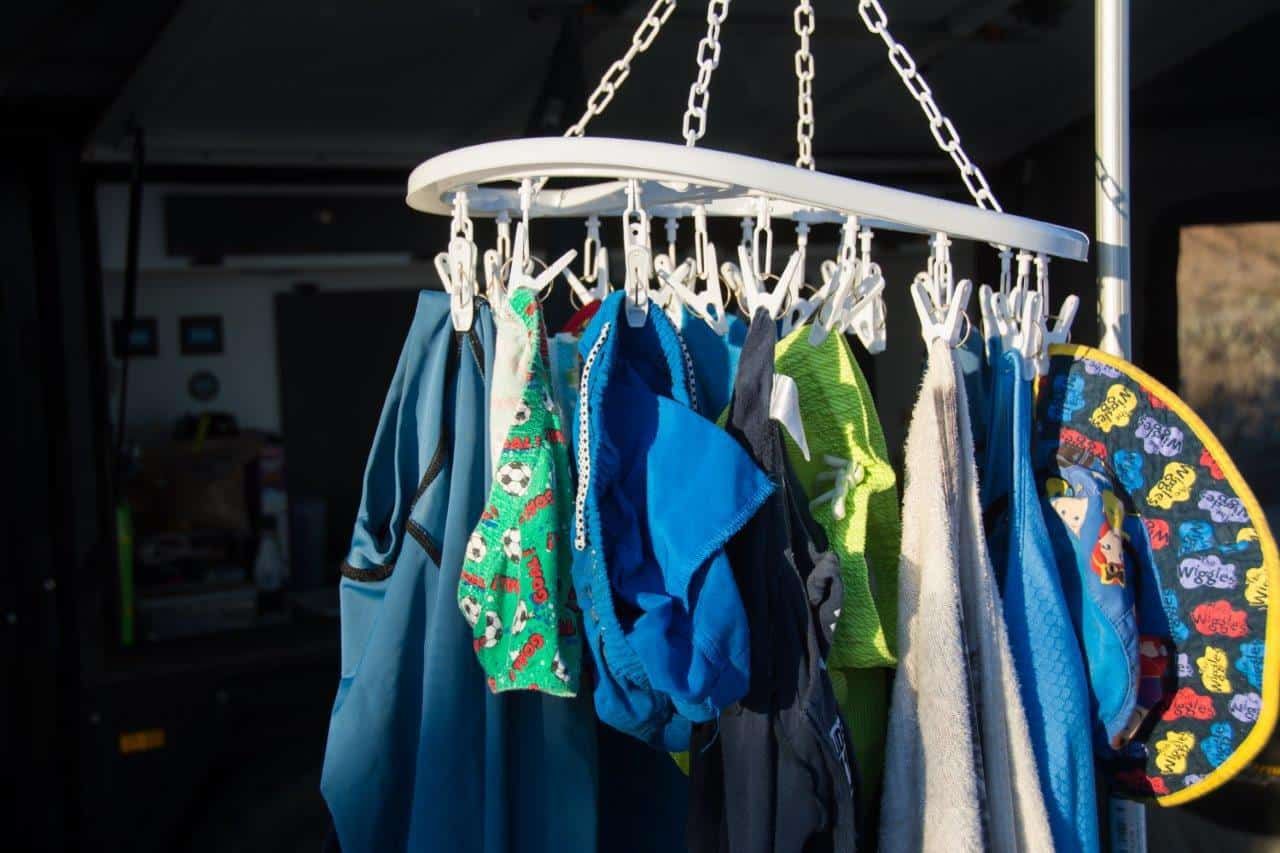Article from 4WDing Australia.
Camp and travel for long enough on the road and you’ll soon run out of clean clothes. No matter how many times you turn them inside out and back to front (just kidding!), eventually they will stink and need a wash. When you are travelling, what’s your options for Camping Laundry, and getting washing done?
In this post we take a look at everything from hand washing to Caravan Washing Machines, DIY options and more.
So, how do you get laundry done when camping and Caravanning?

Drying clothes when camping
How do you wash and dry clothes on the road?
Caravan Park Laundry Facilities
A lot of people call into Caravan Parks purely for a good shower and to wash some clothes, and we often fall into this category too. Most caravan parks have laundry facilities, which range from $3 to $7 per load of washing, and a similar price for using their dryers. We do a couple of loads where possible, and hang it on the washing line for half a day, and then you are good for another week or so.

Washing on the road
Using caravan park laundry facilities in Dampier
For us, this is the most common way of getting laundry done on the road. We tend to pull into a caravan park every once and a while to recharge, fill up with water and replenish food again in town before heading off on another adventure.
We prefer not to stay in Caravan Parks where possible as there are nicer, cheaper and quieter places available, but they are the perfect place to recharge as needed.
Laundromat
If you don’t want to call into a Caravan Park, there are laundromats around the place which will do the same thing. You can put your washing on while you go to the local grocery store and pick up the food you need, and not have to stay at a Caravan Park if you don’t want to.
Hand wash
Yep, believe it or not, but hand washing was common practice a few decades ago and it still works just fine today! The ideal way to wash clothes by hand is to use a product that doesn’t need rinsing. We use Earth Choice Wool Wash and have found it to be decent.
It’s not nearly the same as proper washing detergent in your machine at home and tends to leave some heavy stains (particularly on the kids!), but your clothes are clean and for us that’s all we really care about.
All you need is a bucket, some water and wool wash. Soak your clothes for at least 10 minutes, then give them a good stir and shake before ringing them out as much as possible and hanging them on the line.

Hand washing at Bullara
Hand washing in a 16L stainless steel bucket
What’s great about the wool wash is you don’t have to rinse the clothes, which means you save a huge chunk of water.
If you were to hand wash with normal detergent it’d be annoying as the soap suds would need rinsing off, and that’s quite hard to do by hand.
DIY washing setups
If you are a bit more adventurous, there are a few DIY washing setups that work well. The first is a bucket with a lid that seals well. Add your clothes, water and the washing liquid, and stick it in the back of your car, or on the roof. While driving, your clothes will get a good wash, and this applies especially if you are driving on corrugations or a 4WD track!
Alternatively, you can use a plumbers toilet plunger with a few holes drilled in it, and just move it up and down inside a bucket. Essentially, any way that you can get the clothes and water to mix well with the washing liquid/powder is going to clean your clothes. A lot of people take a bucket with them for other purposes, so it doubles up.

Drying washing when camping
Drying our washing next to Emu Creek Station River
I’ve seen people put two buckets together, with the bottom one having the clothes in it and a number of holes. Using the top bucket, push it down and the water runs out through the holes at the bottom. For us, camping in warm weather is ideal and even if you hang them up soaking they’ll dry pretty quickly.
Scrubba wash bag
A product that’s been around for a while now is the Scrubba wash bag. It’s literally a waterproof bag (like you’d take kayaking) with rubber nodules on the inside. Fill the bag with a few clothes, your washing liquid and water, and then put them on the ground where there’s nothing to cause a puncture.
Roll them back and forth for a few minutes, and the nodules aid with the washing of clothes. Drain it all out, and hang them up.
A few people have said you can use washing beads and a normal wash bag (which is much cheaper), so there are a lot of ways to go about it.
For us, a Scrubba Wash Bag would be great, but they don’t hold a lot of clothing, which means you have to do a lot of washing loads. We’d rather just hand wash a big one in a bucket!
Portable electric washing machines
For those who are travelling long term, a portable washing machine has become the preferred option. They are not too expensive, and will pay for themselves very quickly in the cost of washing especially when you have a family with plenty of clothing.
You can get small Caravan Washing Machines that live in a caravan, or more portable units that you can keep in the back of your 4WD or camper trailer, and you just pull them out and use them as needed.
Power consumption of small washing machines
Power wise small washing machines are quite efficient, and most people with a decent inverter, solar and battery system will be able to run one quite easily. Its worth noting that these are very useful when it comes to the spin cycle, as the drying is what takes the most time and you cannot hand wring them nearly as well.
We have been guilty of hand washing and then putting the clothes in our folks caravan washing machine to spin the water out.

3000W Inverter
You need a decent inverter and battery system to run a washing machine, but not huge.
Water consumption
The kicker, and problem with using a portable washing machine is the water consumption. Most use between 15 and 25 (or sometimes far more as they advertise per cycle, which excludes the rinsing part of it) litres of water per cycle, and that is generally a fair chunk of what people carry.
Of course, if you are in a caravan park then you’ve paid for, and have unlimited water but if you are out in the middle of the bush this isn’t usually the case. You can use clean creek and river water, but some people aren’t too keen on doing this.

Water tank gauge
Expect to use a fair chunk of water washing clothes, especially in a machine
Manual washing machines
If you’ve been searching around, you might have seen the Ezywash, or other manual washing machines. These tend to be small, light weight and use less water (and no electricity!). Instead, you have to use some muscle to make them work.
The Companion Ezywash is one example, along with the Manual Spin washing machine by Outback Equipment.
Drying your washing
Once you’ve washed your clothes, you’ll need a way to dry them. Unless you are in a caravan park or laundromat and have access to a dryer, this is out of the question. The most common option is simply to hang it out. We use a portable clothes line that is light weight and has been pretty good, or we’ll tie some rope between the camper and car, or two trees.

Portable washing line
Drying our clothes on the portable washing line at Pender Bay
If you have a caravan, you should absolutely build an awning washing line as they are always with you, require no setup and are generally long enough to keep you washing and drying clothes effectively. It also means if it rains your clothes stay dry.

Caravan washing line
Stainless wire makes a great Caravan Washing Line
A lot of people ring their clothes out prior to hanging them (if they haven’t been spun). When you ring the clothes out, don’t be too brutal. You’ll damage them, especially if you are a big, strong bloke. It’s better to squash them than twist then, mainly for tee shirts!
Sarah’s been unhappy with me in the past for stretching clothes by wringing them out with a bit too much muscle!
Otherwise, let them drip dry. It takes a while, but on a warm day (like we often get in Australia) its surprisingly fast. We’ve hung clothes out that are dripping wet, and if you come past in 30 minutes time you can squeeze the sleeves out (or wherever the water has run to) and it will dry within the day, comfortably.
Camping Laundry summary
Ultimately, you need clean clothes on the road, and there’s a huge number of ways to go about it. We have been considering getting a small portable washing machine but a lot have pretty average reviews, so we’ll see.
What do you use for washing your laundry on the road?


